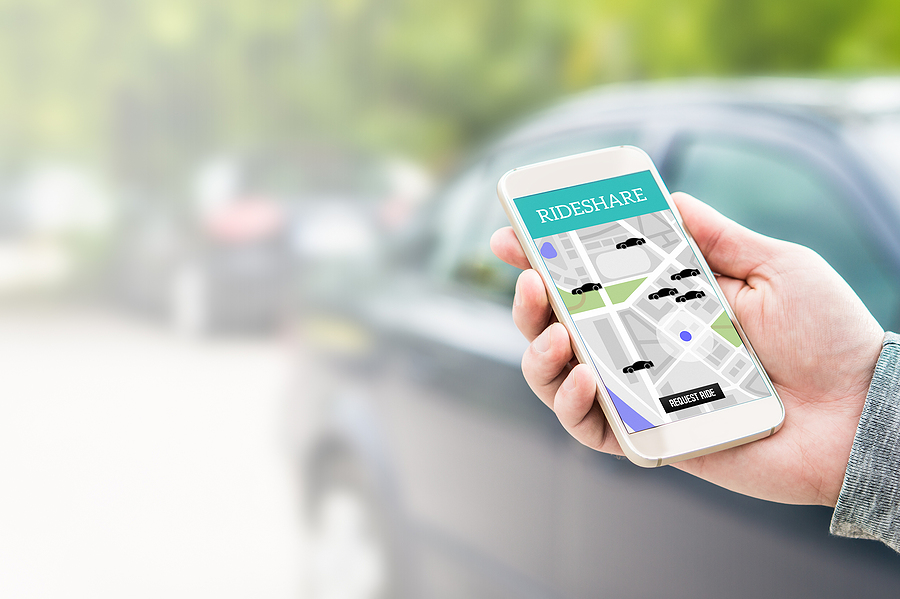- South Carolina Personal Injury Lawyers
- South Carolina Car Accident Lawyers
- South Carolina Truck Accident Lawyers
- South Carolina Motorcycle Accident Attorney
- South Carolina Brain Injury Lawyers
- South Carolina Burn Injury Lawyers
- South Carolina Bus Accident Lawyers
- South Carolina Catastrophic Injury Lawyers
- Child Injuries
- South Carolina Dog Bite Lawyers
- South Carolina Drunk Driving Accident Lawyer
- South Carolina Hospital Fall Lawyer
- South Carolina Nursing Home Abuse Lawyer
- South Carolina Pedestrian Accident Lawyers
- South Carolina Premises Liability Lawyer
- South Carolina Slip and Fall Lawyers
- South Carolina Spinal Cord Injury Lawyer
 Ridesharing companies, such as Uber and Lyft, are extremely popular in South Carolina. Rideshare services are convenient, affordable, and an excellent option for those who don’t own a car or license, or those who want to avoid drinking and driving. But using a rideshare service comes with risks. As with any form of transportation, accidents happen, often leading to injuries and death. Because these services are a relatively new phenomenon, sorting out liability and determining who is liable for your injuries is often lengthy and complicated. If you sustained injuries in a ridesharing accident, consult the South Carolina rideshare accident lawyers at Hughey Law Firm as soon as possible to protect your rights and discuss your legal options.
Ridesharing companies, such as Uber and Lyft, are extremely popular in South Carolina. Rideshare services are convenient, affordable, and an excellent option for those who don’t own a car or license, or those who want to avoid drinking and driving. But using a rideshare service comes with risks. As with any form of transportation, accidents happen, often leading to injuries and death. Because these services are a relatively new phenomenon, sorting out liability and determining who is liable for your injuries is often lengthy and complicated. If you sustained injuries in a ridesharing accident, consult the South Carolina rideshare accident lawyers at Hughey Law Firm as soon as possible to protect your rights and discuss your legal options.
Why Choose Hughey Law Firm for Your Lyft or Uber Accident Case?
Since our founding, the South Carolina personal injury lawyers at Hughey Law Firm have advocated for victims’ rights, especially those who suffered an injury or death because of another person’s wrongful actions. We are not afraid to take on challenging litigation and have argued cases before the South Carolina Supreme Court and the Court of Appeals. Through the years, we have recovered over $190 million in personal injury lawsuit settlements and verdicts for our clients, and we can help you, too. Whether you are a passenger in a Lyft or Uber vehicle involved in an accident, the occupant of another vehicle struck by a rideshare driver, or a pedestrian or cyclist hit by an Uber or Lyft, you may be entitled to seek compensation for your medical bills and other losses. Contact a car accident lawyer at Hughey Law Firm today for your free consultation.
South Carolina Ridesharing Basics
The number of Americans who have used ridesharing services has more than doubled in recent years. According to Statista, approximately 25 percent of Americans use rideshare services at least once per month. Researchers project that the global ridesharing market will grow by more than 133 percent between 2022 and 2028. The two most popular services are Uber and Lyft.
In South Carolina, lawmakers often refer to Uber and Lyft as transportation network companies. Ridesharing is a service that arranges one-way transportation on short notice. Rideshare users request transportation by using an Uber or Lyft app on their phones. Riders request the type of service they want and input their destinations.
A prospective passenger can specify the type of service, ranging from inexpensive options to luxury cars. The app locates the user through the GPS feature on the user’s phone and matches the user with the nearest available driver. Once the app assigns a driver, it displays the driver’s name, license plate number, and route. Prospective passengers can track the driver’s location and receive a text message once the driver arrives.
Rideshare Insurance in South Carolina
Rideshare drivers are usually independent contractors rather than employees. Their employment status at the time of an accident affects the insurance coverage an accident victim may receive (if any) from the transportation network company’s insurance policy.
Drivers use their own vehicles. South Carolina requires all drivers, including Lyft and Uber drivers, to carry personal liability insurance with a minimum of:
- $25,000 bodily injury coverage per person
- $50,000 bodily injury coverage per accident
- $25,000 property damage coverage per accident
When the rideshare driver is logged into the transportation network company’s app, Uber and Lyft must provide the following coverage for third-party claims if the driver’s private insurance doesn’t apply:
- $50,000 in bodily injury per person
- $100,000 in bodily injury per accident
- $25,000 in property damage per accident
When the Uber or Lyft driver is in route to pick up a passenger and during trips, the rideshare company must provide the following auto insurance in the event of a Lyft or Uber accident:
- $1 million third-party liability insurance
- Uninsured/underinsured motorist bodily injury and/or first-party injury insurance
- Contingent comprehensive and collision coverage up to the actual cash value of the car with a $2,500 deductible
Common Causes of South Carolina Ridesharing Accidents
As in other motor vehicle accidents, negligence is responsible for most transportation network company crashes. If drivers breach the duty to exercise reasonable care when driving, they may face liability for the losses suffered by an injured victim. The injured person must prove that the driver acted negligently and that the injuries resulted from that negligence. In some cases, a rideshare driver and another driver may share liability for a crash, in which case they both may face financial responsibility.
Common causes of accidents include:
- Distracted drivers. Rideshare drivers face many distractions, including monitoring their GPS devices, checking the rideshare app for prospective passengers, or looking for their assigned passengers. Any distraction, even for a moment, can lead to an accident.
- Abrupt or illegal U-turns that cause a crash as rideshare drivers look for their passengers.
- Illegal or unsafe lane changes.
- Speeding, which means either exceeding the posted speed limit or going too fast for conditions.
- Driving under the influence of alcohol or drugs. Even some prescription medications can cause impairment.
- Driver fatigue. Like truck drivers, rideshare drivers often drive for long hours without enough rest. Driver fatigue is as dangerous as driving while under the influence of an intoxicating substance.
- Failure to properly maintain the vehicle. Drivers are usually trying to make as much money as possible. They may delay spending time and money on maintenance and necessary repairs.
- Failure to obey traffic signs and signals.
- Tailgating.
- Road rage
- Aggressive driving. Aggressive drivers are dangerous drivers.
In a recent survey of rideshare users, DriversEd.com’s Reckless Ridesharing Report, 35 percent of users felt that their rideshare driver was driving recklessly. 29 percent reported incidents of a driver texting, and another 16 percent reported a driver checking social media on their phones. Other dangerous driver behaviors included impaired driving, inappropriate behavior, watching videos on a phone, and exhibiting road rage.
Common Injuries Resulting From South Carolina Ridesharing Accidents
As with all accidents, rideshare accident injuries vary widely—from minor to catastrophic to fatal.
Here are just a few of the more common types of injuries that can result from Lyft or Uber accidents:
- Traumatic brain injury (TBI) – According to the Centers for Disease Control (CDC), a traumatic brain injury often occurs because of a car accident. The victim may suffer serious, long-term consequences.
- Spinal cord injury – These are often catastrophic injuries, limiting mobility and sensation.
- Internal injuries – The symptoms of internal injuries may not appear right away, but left untreated, internal injuries may prove extremely dangerous.
- Broken bones – A serious car accident can result in one or more broken bones.
South Carolina Rideshare Accident Claims
The law regarding rideshare accidents is complicated, partly because drivers are independent contractors rather than company employees, so it may prove difficult to determine who is liable for your injuries. In a rideshare accident, there are usually multiple insurance companies involved. If the driver of the rideshare vehicle is at fault for the accident, you may qualify to seek compensation from the driver’s insurance company.
If the accident occurs while the rideshare vehicle is transporting a passenger, you may seek compensation from any insurance policies offered by the rideshare company. If another driver causes an accident with your Uber or Lyft, you may qualify to seek compensation from that driver and the driver’s insurance policy. In some cases, you may wish to file a lawsuit in civil court.
If you wish to pursue compensation through the court system, South Carolina law generally gives car accident victims three years from the date of the accident to bring a ridesharing accident claim. If you miss this deadline, you cannot obtain compensation through the courts. There are some exceptions to this deadline so consult a rideshare accident lawyer as soon as possible after your accident to determine how much time you have to pursue compensation.
Compensation From a South Carolina Rideshare Accident
Some of the most common types of damages resulting from a rideshare accident include:
- Current and ongoing medical treatment costs. These may include emergency treatment, hospital stays, continued treatment by doctors or other medical professionals, surgery, medication, any necessary medical equipment, physical or occupational therapy, and more.
- Lost income and diminished earning capacity.
- Pain and suffering, which is physical and mental anguish caused by the accident, along with loss of quality of life.
- Wrongful death.
- Punitive damages. The court only awards punitive damages in limited circumstances. To recover punitive damages, you must provide clear and convincing proof of willful, wanton, or reckless actions. South Carolina places a cap on punitive damages in most cases.
South Carolina Ridesharing Risks
When you decide to use Uber or Lyft, you are stepping into a stranger’s car. There are certain risks, so you should exercise caution.
Case and point, in 2019, South Carolina college student Samantha Josephson was murdered, allegedly by an individual who she thought was a driver for a ridesharing service. As a result, South Carolina now requires drivers to display the license plate information of their vehicles and provides guidelines for potential punishments, including fines and incarceration, for people who misrepresent themselves as rideshare drivers.
If you feel uncomfortable or think you’re in danger, always err on the side of caution and report the driver. Risks to look out for include:
- Car and pedestrian accidents. Sitting in the back seat of a car, users may forget to think about normal traffic safety. Pay attention to where you are going and whether the driver is operating the car safely.
- Criminals. Even drivers who pass a background check may still commit a crime. An investigation by CNN reported that over 100 drivers in the previous four years were accused of assaulting passengers, and at least 31 were convicted.
- Fake drivers. Criminals posing as rideshare drivers may go on to assault their passengers.
Driver and Vehicle Requirements for South Carolina Ridesharing Services
Most rideshare companies have certain minimum requirements for their drivers.
For example, the requirements for Uber or Lyft drivers include:
- A minimum age requirement of 21 years old.
- Must have a valid driver’s license for at least one year for Lyft, or three years for Uber, if you’re under 23 years old.
- Personal car insurance under your name that meets the state’s minimum requirements.
- A Social Security number.
- Undergo a background check, which is a screening service conducted by a third party. The purpose of the background check is to reveal any criminal background, charges related to reckless driving, DUIs, or car accidents, suspended licenses, and operating a vehicle without insurance. The TNC accepts or rejects a driver’s application based on the results of the background check.
In addition, most TNCs have minimum vehicle requirements, such as valid license plates, four doors, be 15 years old or newer, and pass a safety inspection. In South Carolina, the Office of Regulatory Staff is responsible for regulating TNCs and their drivers.
Contact the Rideshare Accident Attorneys at Hughey Law Firm Today
A statute of limitations places a deadline on filing a civil or criminal claim. South Carolina law provides that, in most cases, a car accident victim has three years to bring a ridesharing accident claim.
When you use a TNC, you have a right to expect a clean, courteous, efficient, and, above all, safe experience. Unfortunately, that is not always the case. A ridesharing crash can leave you shocked and in pain. Beware of quick settlement offers from insurance companies. Their goal is usually to settle claims as quickly and inexpensively as possible. If anyone offers a settlement or asks you to sign a release or other documents, you should first speak to an experienced South Carolina ridesharing attorney.
For more information or to arrange a free initial consultation, call Hughey Law Firm at (843) 881-8644, or contact us online today.
Client Testimonial
“Thank you Hughey Law Firm! It was a pleasure to work with you on my case! From the beginning, every contact I had with your firm was professional, kind, helpful, and painless! I always felt kept in the loop, and important to you as a client. If you are looking for a personal injury attorney with integrity, I would highly recommend Hughey Law Firm!”
Rating: 5/5 ⭐⭐⭐⭐⭐
Karen C.
Read more reviews on Google!


